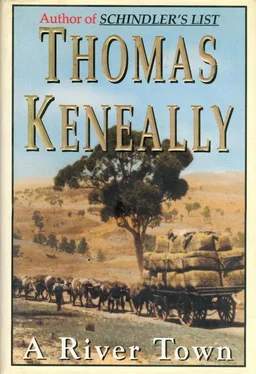Thomas Keneally - A River Town
Здесь есть возможность читать онлайн «Thomas Keneally - A River Town» весь текст электронной книги совершенно бесплатно (целиком полную версию без сокращений). В некоторых случаях можно слушать аудио, скачать через торрент в формате fb2 и присутствует краткое содержание. Город: New York, Год выпуска: 2011, ISBN: 2011, Издательство: Nan A. Talese, Жанр: Историческая проза, на английском языке. Описание произведения, (предисловие) а так же отзывы посетителей доступны на портале библиотеки ЛибКат.
- Название:A River Town
- Автор:
- Издательство:Nan A. Talese
- Жанр:
- Год:2011
- Город:New York
- ISBN:978-0-307-80063-3
- Рейтинг книги:4 / 5. Голосов: 1
-
Избранное:Добавить в избранное
- Отзывы:
-
Ваша оценка:
- 80
- 1
- 2
- 3
- 4
- 5
A River Town: краткое содержание, описание и аннотация
Предлагаем к чтению аннотацию, описание, краткое содержание или предисловие (зависит от того, что написал сам автор книги «A River Town»). Если вы не нашли необходимую информацию о книге — напишите в комментариях, мы постараемся отыскать её.
.
A River Town — читать онлайн бесплатно полную книгу (весь текст) целиком
Ниже представлен текст книги, разбитый по страницам. Система сохранения места последней прочитанной страницы, позволяет с удобством читать онлайн бесплатно книгу «A River Town», без необходимости каждый раз заново искать на чём Вы остановились. Поставьте закладку, и сможете в любой момент перейти на страницу, на которой закончили чтение.
Интервал:
Закладка:
I should expose the bloody poets, Tim promised himself. That’s the letter I’ll write to the Chronicle ! For Ernie’s sake, but for Winnie’s above all. For she’d believed them. Believed the posturers, the death-flirtatious buggers, and here she was in a plague ward amongst gum trees.
He took a decision to get up and follow the direction Ernie had taken. No mask on, since with Sister Raymond on duty no closeness could be hoped for. Following the corridor he reached a point from which he could see into Winnie Malcolm’s room. Nothing there that was up to the high level of Tennyson. The plainness of it all brought that instant sting of grief. Winnie very flushed, her face unencumbered and open, since she was beyond protecting… Seeing Ernie, and pushing at him with her fists. Ernie stepping back, uttering through the linen gag he wore un-poetical, forlorn sobs, moist in the wrong way for grandeur. But truly mourning also, poor fellow. Not the sort of sound normal to a mongrel pillar of the bush.
Sister Raymond soothed mewling Winnie with a wet cloth, holding her by the shoulder and persuading her to drink the second half of a cup of something—bromide, laudanum, God knows what. Something Lethean, Tim hoped. To make her serene. How could Ernie, whose duty was to love her, restrain himself at such a time?
“Now sit down by the door, Mr. Malcolm, if you don’t mind,” said the nurse, forcing the dose over Winnie’s lips.
Splendid Winnie Malcolm grew quieter—weakness and the drug curtailed the low drama, loosened her face, made it serene. On his chair, Ernie raked the backs of his hands with his nails and said at last so much, so many appeals to God and mercy, that Sister Raymond looked at him with something less than patience.
“Now we must be calm. Do you want us to have to bring more and more nurses?”
“No, no,” Ernie agreed. “But it’s too bloody cruel.”
“And it must be borne,” said Sister Raymond.
“I’m not afraid of bearing things,” Ernie claimed like a child on the edge of some darkness.s
All the thwarting of Tim’s letter to the Commissioner, all the betrayal over accounts and all the useless urgings to loyalty and valour meant nothing now to Tim. At this hour, Ernie presented himself as a plain animal in grief.
And this large young woman who commanded them. Be thankful at least for her. She would not permit florid deaths. They were under a duty, he and Ernie, to grieve and be fearful in an orderly manner. Theatre on their parts would only drag in more nurses or masked attendants and spread the peril too broadly.
In the early dusk, as Tim sat on his cot in the men’s ward, one of the white-coated men went by unmasked in the garden. Idly moving amongst the rhododendrons. Sun-leathered, about Tim’s age. Tim swore he’d never become such a man if lucky enough to live on. He’d get work hauling, cutting or milking rather than this. The fellow looked aimless, glancing up at the highest branches of a red gum. No doubt he and his mate paid a margin for plague duty, for waiting in their hut in the garden and carrying food and medicine back and forth, carrying the thunder-boxes. Carrying Primrose. But what margin would be worth it? And were they scared too? They certainly maintained a distance and didn’t swap their names with him and Ernie. Men with a memory of labour so fierce that they’d rather now be paid to hang around for the plague’s pleasure.
Soon after this sighting, he heard both attendants came along the path to the armoured door. They talked as they advanced. “Lost half the bloody herd,” Tim heard one of them say. Unlocking the barracks, they came in carrying trays of corned beef, potatoes, split peas, sago pudding. Their gloves, brilliant white, looked delicate on their big hands. Tim watched from his doorway as they put the four meals down on the table in the little kitchen by the door, and one of them went to get the teapot while the other began to trim and light the hurricane lamps. This lamplighter saw Tim approaching, held up a hand to keep him at a safe distance, and asked, “Feeling all right at this stage, Tim?”
“Thanks. It’s a bugger but I’m perfectly well so far.”
“Saw you walloping the cricket ball at Toorooka. Bloody good innings.”
“Ah yes,” said Tim gratefully. “My son’s a great chucker of the ball, did you notice?”
The lamp-trimmer nodded in his mask. “Fires upriver did for me. Lost half the bloody herd.”
But still no offer of his name. The other one went out again and came back with the teapot. Then both men left, locking the door. “Dinner,” Tim called as melodiously as he could down the corridor. Past the closed door beyond which Primrose had perished.
Entering the kitchen with Ernie, Sister Raymond took off her mask and then Ernie’s, stripped off her gloves, threw everything into the bucket of carbolic and water. She washed her hands with the prescribed carbolic soap—Tim watched all this, this antiseptic rite—and ate her meal quickly, standing at the kitchen bench, her back to Tim and Ernie.
“The corned beef will make us thirsty,” Ernie plaintively announced at the end of the table. He ate little before fetching a fresh mask without having to be told to, and returning to his station on the chair in the room along the corridor. Tim and Ernie plague-trained in less than a day by this rigorous nurse.
“Don’t go up close though,” Sister Raymond called after the accountant.
Not feeling entitled to crowd in on Ernie and Winnie, Tim loitered on his side in the male ward. The men could be heard coming in to take away the remnants for burning or burial. Tim could hear them chinking the plain china together as they exited.
He wondered were there sick half-castes and spiritual women in Grafton, Lismore, Bellingen, Taree? Or was the plague particular to this valley and to Sydney? If the latter, were they writing him up as a “contact” in the Sydney Morning Herald?
How sweet if released from here to make himself in a new town, taking definite account that everywhere there were Billy Thurmonds, M. M. Chances, Ernie Malcolms to be courted and reassured. Everywhere Lucy Rochesters looking for the sea or lost parents. He must give them a place at table too, no matter what Kitty told him about new-arriving Kennas. But within those limits, re-making yourself. Talk to Old Burke about a loan for a pub. Then, be a harder man! Meagher the publican had learned to be hard. Not to return cash to drunkards’ wives.
In darkness the new visitor was rapping on the door of the plague barracks, and then opened it with his key. Dr. Erson. Erson went by down the corridor in his fresh houndstooth suit.
The doctor could soon be heard discussing Winnie’s vital signs with demented Ernie. Tim waited. Winnie, Winnie. Erson came back past Tim’s door on his way to the dispensary. Some energetic washing went on there, hands were flapped about in the carbolic. When he walked in again to visit Tim, he looked perhaps tired. Perhaps fearful. He had his gloves off to feel the pulse in Tim’s wrist and placed the back of his hand against Tim’s forehead, but then put them on again to feel the glands under the chin and the arms and in the groin. He asked about joint pains and fever.
“Be kind to our friend Malcolm,” he murmured then to Tim. “We have hope for his wife, but…” The doctor looked steadily at him now. “The bubonic plague in the Macleay. Not possible says my every instinct. We must insist shipments to the Macleay are all unpacked and directly fumigated. That’s the only way. Perhaps you could mention that should people like Offhand ask you.” The doctor sighed to indicate the beginning of reflectiveness. “The plague returns at the end of a startling century and in a new location. To remind us that even here we are dust.”
Читать дальшеИнтервал:
Закладка:
Похожие книги на «A River Town»
Представляем Вашему вниманию похожие книги на «A River Town» списком для выбора. Мы отобрали схожую по названию и смыслу литературу в надежде предоставить читателям больше вариантов отыскать новые, интересные, ещё непрочитанные произведения.
Обсуждение, отзывы о книге «A River Town» и просто собственные мнения читателей. Оставьте ваши комментарии, напишите, что Вы думаете о произведении, его смысле или главных героях. Укажите что конкретно понравилось, а что нет, и почему Вы так считаете.












